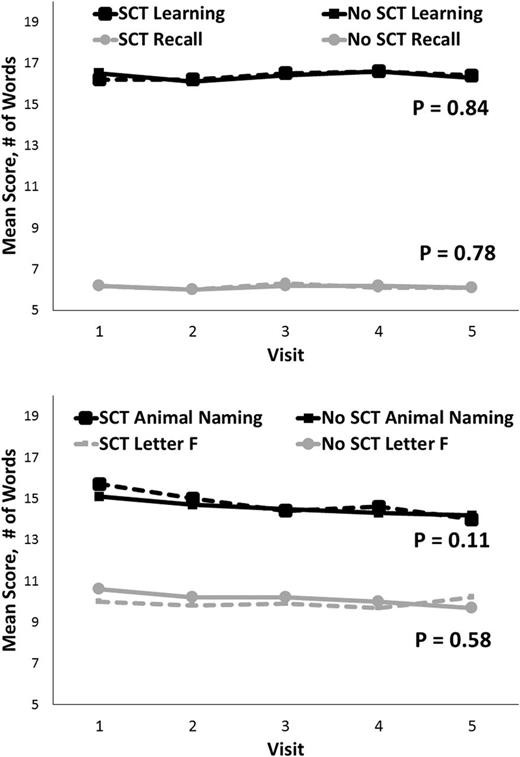Abstract

Background: Sickle cell anemia (SCA) has been associated with cognitive dysfunction. Increasing evidence suggests that some complications of SCA, such as kidney disease and venous thromboembolism, also affect those with sickle cell trait (SCT). Thus, SCT may not be a benign condition. Based on these findings, we hypothesized that SCT is a risk factor for cognitive function in African-Americans. We previously reported no association of SCT with cognitive impairment evaluated by a global screening test. Here we studied specific cognitive function measures.
Methods: We studied African-American adults aged 45 and older from a national prospective cohort study of 30,239 white and black Americans; the REGARDS study. Participants were enrolled in 2003-7 and followed for up to 10 years. We collected extensive baseline risk factor data, and administered a cognitive battery every 2 years including tests of learning and memory (Word List Learning (WLL), Word List Recall (WLR)), semantic fluency by the Animal Naming test, and phonemic fluency by the Letter F test. WLL is the sum of words learned over 3 trials of immediate recall of 10 words (score ranges 0-30 words). WLR is the sum of words recalled after intervening questions (range 0-10 words). The Animal Naming score is the number of animals a participant can name within 1-minute and the Letter F score is the number of words beginning with the letter F that a participant can say within 1-minute. Participants included in this analysis were African-Americans without SCA or prebaseline stroke, who had SCT genotyping. Participants with baseline cognitive impairment by a global screening test were excluded. Mixed models were employed to assess the association of SCT with repeated measures of each test, adjusted for risk factors. Censoring occurred at the time of a stroke, death or withdrawal from the study.
Results: There were 7,078 participants with at least 1 assessment of WLL and WLR who met inclusion criteria; their mean age was 63.4 years, 64% were women, and 517 had SCT. Those with SCT were more likely than those without to have hypertension (65% vs 60%; p=0.04), no alcohol use (75% vs 70%, p=0.03), and lower estimated glomerular filtration rate (eGFR) (86 vs 90 ml/min/1.73m2; p<0.0001). They were similar on other factors. The top panel of the figure shows that WLL and WLR changed little over time and there was no difference in scores by SCT status (adjusted p values shown). There were 7,296 participants included in the Animal Naming analysis and 5,946 for Letter F (differences due to delays in processing scores). The lower panel of the figure shows that performance on both tests worsened over time, with no difference by SCT status (adjusted p values shown).
Conclusion: In this prospectively followed general population cohort of middle-aged and older African-Americans with longitudinal cognitive function testing, SCT was not associated with differences in cognitive functioning.
Figure. Sickle Cell Trait and Longitudinal Change in Cognitive Doman Measures
Dashed lines represent those with sickle cell trait and solid lines those without sickle cell trait. Models were adjusted for age, sex, education, income, region of residence, alcohol use, smoking status, exercise, history of heart disease, hypertension, systolic blood pressure, left ventricular hypertrophy by ECG, hyperlipidemia, albumin-creatinine ratio, estimated glomerular filtration rate, statin use, diabetes and atrial fibrillation.
No relevant conflicts of interest to declare.
Author notes
Asterisk with author names denotes non-ASH members.

This icon denotes a clinically relevant abstract


